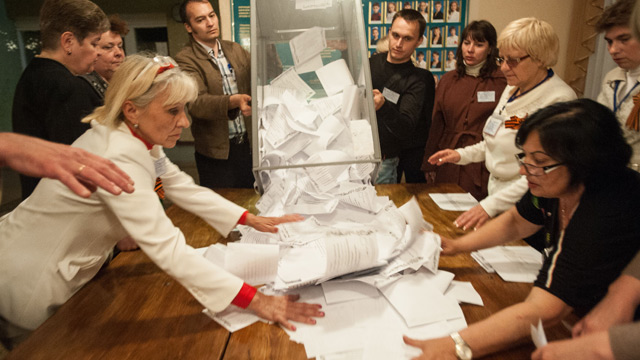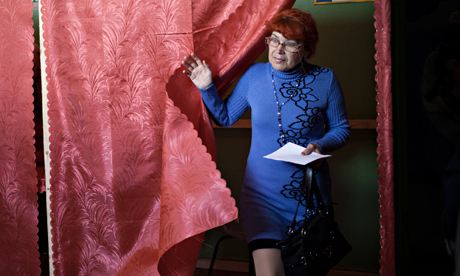 Link to video: Ukraine rebels claim victory in self-rule referendumUkraine: pro-Russia separatists set for victory in eastern region referendum
Link to video: Ukraine rebels claim victory in self-rule referendumUkraine: pro-Russia separatists set for victory in eastern region referendum
Πολύ καλό και αποκαλυπτικό το ρεπορτάζ των ανταποκριτών του guardian στην ανατολική ουκρανία χτές. Ειδικά οι δηλώσεις κατοίκων δείχνουν την εθνικιστική διαίρεση που συνεχίζει να αυξάνει.
Πιο πολύ εντύπωση μου έκανε η δήλωση μιας γιαγιάς που υποστηρίζει την ένωση με τη Ρωσία: "Διαφώνησα με τη γεινότισά μου, η οποία μου είπε το πρωί να μην πάω να ψηφίσω και ότι δεν χρειαζόμαστε τιποτα από όλα αυτά. Για να είμαι ειλικρινής, με εξέπληξε το ότι είχε φασιστικές αντιλήψεις. Φαινόταν καλός ανθρωπος"!!! Πιο κοντά στην πραγματικότητα μου φαίνεται πάντως η δήλωση ενος φοιτητή που δεν είναι ούτε με τους αυτονομιστές ούτε με την κυβέρνηση του Κιέβου: "Βασικά, την έχουμε γαμήσει"...
Πιο πολύ εντύπωση μου έκανε η δήλωση μιας γιαγιάς που υποστηρίζει την ένωση με τη Ρωσία: "Διαφώνησα με τη γεινότισά μου, η οποία μου είπε το πρωί να μην πάω να ψηφίσω και ότι δεν χρειαζόμαστε τιποτα από όλα αυτά. Για να είμαι ειλικρινής, με εξέπληξε το ότι είχε φασιστικές αντιλήψεις. Φαινόταν καλός ανθρωπος"!!! Πιο κοντά στην πραγματικότητα μου φαίνεται πάντως η δήλωση ενος φοιτητή που δεν είναι ούτε με τους αυτονομιστές ούτε με την κυβέρνηση του Κιέβου: "Βασικά, την έχουμε γαμήσει"...
There were no international observers, no up-to-date electoral lists, and the ballot papers were photocopies. With heavily armed men keeping watch, ambiguous wording on the ballot slip and a bungled Ukrainian attempt to stop voting in one town that ended with one dead, it was clear that this was no ordinary referendum.
But as pro-Russia separatists announced a landslide victory for the proposition that called for the creation of two new, quasi-independent entities in eastern Ukraine, it was equally clear that Sunday's voting marked a new watershed in the country's crisis.
One of the separatist leaders promptly served warning that all Ukrainian troops on his territory would become illegal.
The head of the de facto electoral commission said on Sunday night that nearly 90% of voters in the eastern Ukrainian region of Donetsk voted for self-rule. "89%, that's it," Roman Lyagin said.
On Monday, organisers in the neighbouring Lukansk region said 96% had voted for independence.
"All military troops on our territory after the official announcement of referendum results will be considered illegal and declared occupiers," Denis Pushilin said. "It is necessary to form state bodies and military authorities as soon as possible."
The head of the de facto electoral commission said on Sunday night that nearly 90% of voters in the eastern Ukrainian region of Donetsk voted for self-rule. "89%, that's it," Roman Lyagin said.
The referendum in Donetsk and Luhansk regions, which Russia's president, Vladimir Putin, advised local leaders to postpone, came as widespread anger mounted over Ukrainian military moves against armed separatists.
There was a further bloody incident on Sunday as a detachment of Ukraine's National Guard arrived in the town of Krasnoarmeisk. According to witnesses, they were angrily accosted by unarmed locals and subsequently opened fire, killing one and wounding two.
The authorities in Kiev have said these are "anti-terrorist operations", but they have resulted in a number of deaths, most recently in the city of Mariupol on Friday when at least seven people died as Ukrainian forces entered the city.
Only four polling stations opened on Sunday in Mariupol, which is home to 500,000 people. One was in the burned-out city administration building, seized by separatists and scene of fierce clashes in recent days. There were huge queues of people, almost all of whom said they were voting yes to separatism.
In Donetsk, there were also queues to vote, even though many people were unsure exactly of the meaning of the ballot question, which asked: "Do you support the act of state self-rule of the Donetsk People's Republic?"
There have been mixed messages from de facto leaders: sometimes they say it is merely a vote for more autonomy within Ukraine; at other times they say the yes vote is for a new state that would include much of Russian-speaking east Ukraine, while there are also suggestions that the region could join Russia, as Crimea did in March after a controversial referendum.
It is not clear whether Russia has the appetite to annex more of Ukraine, but many of those at polling stations believed that is what they were voting for.
At a polling station in a Donetsk school, Alexander Baturenko, 27, who was one of the volunteers helping to organise the vote, said he hoped the region would become part of Russia. The economics graduate, who now works in as an accountant in a big company, said: "It's much quieter and more peaceful there. Here it's one president after another; there it never changes."
Ludmila Babushkina, 78, said she had cast her voted to protect the region from "fascists" in Kiev. She said that previously there had been a chance to make some kind of compromise with Kiev, but that none of the leading candidates in the election represented the Russian-speaking east of the country and that now she had decided she wanted to join Russia.
She said the referendum was causing divisions. "My neighbour argued with me this morning and told me that I should not vote, that we don't need any of this. To be honest, I was pretty surprised that she had fascist views. She seemed nice."

A Russian journalist said he had been allowed to vote despite not showing any passport, while others reported they were able to vote several times.
Lyagin said the referendum was not perfect but was the best thing possible in the current Ukrainian climate. "We don't have a legitimate government in Kiev. There is a de facto president of Ukraine, Viktor Yanukovych, and just because he is not at his desk does not mean that other people can take over," Lyagin said. "We have people who are themselves illegal telling us that we are illegal."
In Luhansk, one polling station was set up inside a separatist stronghold – the state security building that they have occupied since early April.
Children posed for photographs by a tank removed from a Soviet monument on the eve of Victory Day by protesters. A man in camouflage handed a small boy a Kalashnikov rifle to pose with.
Some said that voting yes would improve their material position. Andriy Penishenko, 41, said he feared that staying within Ukraine would mean he would lose his job at a locomotive plant.
"If Kiev drags us into the EU or Nato, then they will come and close our plant. Our plant sells its products to Russia and feeds half of the city," he said.
The referendum comes as the region appears to be tottering on the edge of a genuine civil war.
Language and rhetoric has toughened as the death toll has mounted in recent weeks. Comparisons with the Nazis have been flying on both sides. and the armed uprising against Kiev has been portrayed in Moscow and locally as an "anti-fascist" movement. The government in Kiev said Moscow was behaving in a manner reminiscent of Nazi Germany.
The head of Ukraine's security council, Andriy Parubiy, said the referendum was "Putin propaganda" and "similar referendums were held by Hitler in Austria". Parubiy, who led the volunteer security forces during the Maidan protests in Kiev, and now commands the National Guard, a force drawn from the Maidan protesters and used against the separatists in east Ukraine.
He added: "Europe needs to understand that because Hitler was not stopped at the beginning, it led to a huge war and millions and millions of victims. If Russia recognises [the results of the referendum] Ukraine will defend its territory."
So far Kiev's "anti-terrorism operation" has only led to increased anger and alienation among many people in east Ukraine. However, while many people are wary of the new authorities in Kiev, it is unclear how many people really support the separatist movement. Many pro-Ukraine activists have left the region after threats, some have been kidnapped, and most of those who disagree chose to boycott the referendum rather than vote no.
But Andrei, a philosophy student who did not want to give his surname, said: "I haven't voted and nor have any of my friends. It's a referendum for idiots, organised by idiots. Of course I don't want to be part of their absurd republic or join Russia. But having said that, I don't like the new Kiev government either. Basically, we're screwed."
• This article was amended on 11 May to remove an editor's note
http://www.theguardian.com/world/2014/may/11/eastern-ukraine-referendum-donetsk-luhansk


Δεν υπάρχουν σχόλια:
Δημοσίευση σχολίου